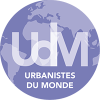Portrait
When Administration Transforms | Magali, STU Class of 2011
Published on | Alumni Portraits
Magali is concluding her academic journey, which she completed entirely at Sciences Po, with an internship at SAMOA (the urban planning agency for the Nantes Island project). She is tasked with organising the "Metropolitan Conference," an annual event that brings together stakeholders from the Nantes/Saint-Nazaire metropolis, providing them the opportunity to reaffirm their commitment to collaboratively shape the future of their region. In its fifth edition, the Conference is particularly focused on local foresight approaches. From the outset, Magali has specialised in governance issues, and this first year-long experience has enabled her to refine her understanding of how metropolitan territorial ecosystems operate.
As her mission comes to an end, Magali is invited by the 27th Region, which was launching its La Transfo programme in the Pays de la Loire region at the time, to present the landscape of prospective approaches currently underway in the area. Various fruitful connections take place at this moment, as her discussions with a classmate who works on forward-looking issues for the 27th Region, and her meeting with Romain Thévenet, co-founder of the 27th Region, provide her with the opportunity to collaborate with this organisation, initially on a part-time basis and under the status of self-employed.
To understand Magali's journey, it is essential to comprehend the role of the 27th Region, a unique laboratory for public transformation. Initiated by FING (the new generation internet foundation) in 2008, the association emerged as a sort of innovation laboratory for ARF, the association of the Regions of France, to envision the functioning of an "ideal Region." Specifically, the 27th Region tests new ways of designing public policies, notably through service design methods.
Why design? For Magali, design provides tools for conception and modelling that allow the issue of usage to be placed at the heart of public initiatives and facilitate experimentation, fundamental characteristics for innovating in public action. The 27th Region is not a disconnected structure, but rather a do-tank whose programmes are concretely integrated within the policies of the member Regions with which it works to change their modes of action. The 27th Region draws inspiration from multiple cultural influences such as service design, the culture of openness and open-source, social innovation, and popular education movements, among others. Its approach generally counters the solutions proposed by major consulting firms, to which public administrations have too often tended to delegate "the grey matter" and strategic reflections, often at the cost of increasing discontent among staff. On the contrary, the bet of the 27th Region is to show that public administration is capable of renewal, that it has the resources and creative potential. In a context where the RGPP and new public management seem to have weakened its capacity for action, the experiments proposed by the 27th Region highlight innovations where they are often least expected!
Within this structure, Magali plays an important coordination role through her position as project manager. Her tasks heavily involve human interaction, as she coordinates the teams of "residents" who successfully carry out the programmes and also works to promote the experiments that arise from them.
- She spends a lot of time in the field, with teams and partners, or on Skype discussing with the teams and "taking the pulse" of the projects, but also with the general delegate who carries out a representation mission and must remain constantly informed of ongoing work. Therefore, her role requires a nuanced understanding of political issues and human skills.
- The other part of her work involves developing new projects for the association, including RE•ACTEUR PUBLIC, a new programme that brings together the State and local authorities to create a new culture of public action.
With this type of missions and projects spread across the whole of France, this position demands a particularly significant commitment, involving a constant tension in her work which can sometimes prove exhausting… and ultimately quite similar to the pace of consultants! Although Magali has taken some time to find her place and sometimes finds it challenging to embrace the "permanent research" position it entails, she is happy to work for an organisation that upholds values and "ways of doing" that resonate with her.
Magali's Advice
Do not underestimate "coordination" roles. With our profiles, we often find ourselves in "super-coordinator/project manager" roles, which can sometimes be viewed as a superfluous, non-essential, or insufficiently concrete function, even frustrating. However, this "interface" position is actually essential, so it is important to appreciate it at its true value. Pursuing experiences where we are challenged to confront our practices with other skills and profiles is always extremely enriching, even if it does not always feel very comfortable at the outset. The advantage of our profiles is that we adapt quite well to fairly different contexts, so one should not hesitate to follow their desires and explore other areas that appeal to them!
The Greater Paris, a matter of territorial strategy
Published on 04 December 2014
This November, In Situ met with Lisa, a graduate of the Master's programme in Territorial and Urban Strategies in 2009, currently in charge of International…
Laurie-Mai DENOUX Class of STU 2010
Published on 11 September 2014
A graduate of the Master's in Territorial and Urban Strategies, Laurie-Mai is currently responsible for supporting local authorities in defining and financing…
 English
English  Français
Français 




